Updated: May 2025
Malaga is an ideal job destination if you want to work in Spain. Thousands of young people from all over the world choose this wonderful city as their home. Are you thinking about doing the same? In this expat guide, you will find all the information you need to get the most out of life in Málaga. From tips for your job search to cultural activities and places of interest to visit in this amazing city. Let's get started!
- How to Find a Job in Malaga
- The Best Way to Get Around in Málaga
- Malaga Culture and Language
- Fun Things to Do in Malaga
- Cost of Living in Malaga, Spain
How to Find a Job In Malaga
Education, work experience, and speaking more than one language are some of the keys that can help you get a job in Malaga. Just like most southern coast cities in Spain, catering and hospitality are popular sectors to work in Malaga. Although these jobs are very common, they can also be subject to seasonal periods with more demand during the summer months (May-September).
Apart from tourism, the construction and agriculture industry are the biggest job generators in Malaga. However, according to data from the Andalusian Regional Government, the Information and Communication Technologies sector is growing very fast and creating new job opportunities where language speakers are in high demand.
Furthermore, Malaga is gradually pushing to become one of the best entrepreneurial ecosystems in Spain. According to some experts, the areas that offer the greatest job placement possibilities in Spain are Madrid, Catalonia, and the Mediterranean Arc which includes the cities of Malaga, Alicante, Valencia, and Barcelona.
Despite the COVID-19 crisis in the Spanish labour market, many companies are still looking for employees to continue their business activity. From the Spanish region of Andalucia, Malaga is the province that has the most job offers, followed by Seville.
When it comes to job hunting, apart from LinkedIn and Indeed, one of the most popular job boards in Spain is Infojobs. However, if you are an expat, we highly recommend you to use Europe Language Jobs, where you can find suitable vacancies in different European languages.
When applying for jobs, it is recommended to attach a cover letter to your CV explaining your motivations.
Working Rights
For EU citizens, there is no need for a visa to work in Malaga. All you will need is the Foreigners Identity Number (NIE) followed by a social security number.
Obtaining NIE
Getting your NIE sometimes can be a tedious procedure, so we recommend you get started as soon as possible. You must make an appointment through this website or go to the Immigration Office located at the police station with all the required documents:
-
EX18 Spanish Residency Application form (previously filled out)
-
Passport and a copy
-
Carta Oferta Formal - you can ask your employer to provide you with it
-
Health Insurance information - find Spanish health insurance here
Your NIE will be ready right away. On this website you can find more information.
Obtaining Social Security Number
Once you have your NIE, your next step is getting your Social Security number at the closest Social Security office (Oficina de Seguridad Social). Their opening hours are usually between 9:00 am and 2:00 pm. In order to get your SS number, you will need the following documents:
-
NIE
-
Passport
-
Carta Oferta Formal from your employer.
They will give it to you on the same day!
For non-EU citizens, a visa will be necessary to go to Malaga together with the NIE and Social Security Number.
Here are some tips to improve the chances of getting a job:
- Go to the office of the INEM in Malaga, this is a public service to help unemployed people find jobs according to their knowledge and experience.
- Visit the Malaga Official Job portal, which has information about the latest jobs in Malaga.
- Pay a visit to the company you want to work for. You can go to the office to introduce yourself and leave a copy of your CV. Like this, you will increase your chances of being hired.
Office / Work culture
The work environment in Spanish companies is very welcoming. Most of your colleagues will exchange chit-chat during the workday, which makes it more enjoyable. Being punctual is essential to make a good impression. Also, teamwork, being motivated, and being decisive are highly valued skills.
The full working day is 8 hours with a lunch break of 1 to 2 hours, although some companies implement the intensive work-day (from 7 to 3 pm). This being said, working remotely has become more common and acceptable due to the COVID. Most of the companies are flexible about it and allow you to combine working from home with going to the office.
Regarding the dress code, companies opt for a semi-formal style. Although, if you work directly with the public, you most likely will be asked to wear a uniform.
One of the benefits of working in Malaga is that on the first Thursday of every month you will have the opportunity to meet with your colleagues after working hours and have a drink. This initiative established by the Young Entrepreneurs Association of Malaga aims to fight stress at work and promote "good vibes" between employers and entrepreneurs.
The Best Way to Get Around in Málaga
Malaga is a very well-connected city that offers a wide range of transport to choose from.
Public transport
Malaga’s bus network is extensive and most lines are operational from 6:45 a.m. to 11:00 p.m., although there are also night-buses. You can check routes, schedules, and prices on the official site of EMT Malaga (both in English and Spanish). One trip costs €1.40, but you can also buy a bus card loaded up to 10 trips for €4.20.
The metro in Malaga has two lines, a total of 11.6 km of underground routes. Line 1 goes from El Perchel neighbourhood to Ciudad Universitaria and line 2 from Poligono Alameda to the Sports Palace. Both pass through the city centre. Check out the map for specific routes.
The metro is operational from Monday to Thursday from 6:30 a.m. to 11:00 p.m.; Fridays and holiday eves from 6:30 a.m. to 1:30 a.m.; Saturdays from 7:00 a.m. to 1:30 a.m. and Sundays from 7:00 a.m. to 11:00 p.m. Tickets can be purchased directly on the bus or at the main stations and there are different types:
- Billete normal: for those who do not use the subway regularly, the price is €1.35 per trip. The ticket can be recharged as many times as you want and used by more than one person at a time without exceeding the number of 9.
- Tarjeta de transport: This card allows you to travel on all means of transportation in the city. You need to pay a one-time fee of €1.50 for a physical card. The minimum charging amount is €5. It can also be used by several people travelling together at the same time.
Taxis
Malaga taxis are white with diagonal blue stripes on the front doors. All taxis have a meter in the front where you can see how much the journey costs. Normally, the fee starts at €4.08 during the day and €45.04 at night, and the cost per kilometre travelled is around €0.93 during the day and €1.13 during the night. Use this calculator to estimate how much you'd be required to pay for getting to your destination.
Airport
Malaga's airport is one of the busiest in Spain and is perfectly connected to the entire Costa del Sol.
Apart from the taxis and train, the best and cheapest option is the A Express (L-75) bus line of the Malaga EMT. This urban line connects the city centre with the airport. One ticket costs €4 and the bus stop is located in Terminal T3, floor 0. You can check the itinerary of the bus using their website. The bus runs all day, there is one every 25-30 minutes and it takes about 15 minutes to get to the centre of Malaga.
If you are going or coming from Estepona, Marbella, or Nerja you also have a good connection with interurban buses.
Train
The Andalusia region has cultural destinations that you cannot miss such as Seville, Córdoba, Granada, and Cádiz. The best way to reach them, if not with BlaBlaCar or by bus, is to use the Spanish train: RENFE. Prices vary between €20-40, depending on the destination. In addition, the Malaga station has a good connection with other cities in Spain, such as Madrid and Barcelona with high-speed train lines (AVE).
Car rent
It is not surprising that there are countless car rental companies in Malaga. Some of these companies are located in the airport or around the city. One of the most famous is MálagaCar.com. It has a personalized pick-up service, 24-hour roadside assistance, and all-risk insurance included in the price.
Almeria
When talking about transportation and how easy it is to get around town, you should consider paying a visit to Almeria as well. It can be reached by either bus or train; it's up to you! The sea water is clean and transparent, seafood is a must-try, and people are extremely welcoming and warm.
There is a handful of useful apps you should download when using public transport in Malaga:
- Citymapper - the app will help you navigate the city, regardless of whether you need to find the best bus connection or the quickest walking route to your destination.
- Omio - will help you find the best deals when you plan to travel by train or by bus.
Malaga Culture and Language
Malaga is a city with a large number of both international and local students. Many young Spaniards choose Malaga as a destination due to its good location (sun and beach) and the wide range of studies available at universities and the jobs on offer, especially those oriented towards tourism and in the summer season. Therefore, if you choose Malaga as a destination, you will have the opportunity to meet young people from all regions of Spain, as well as international young people.
Way of living in Malaga, Spain
The Andalusian way of life is living outdoors, enjoying time with your family and friends. This is not surprising since it is the sunniest region in Spain with more than 2,800 hours of sunshine per year. The good weather makes people happy and, on a daily basis, they enjoy their afternoons in the streets and bar terraces.
LGBTQ+ Community
Spain as a whole is a pioneer in terms of equality. It was the 3rd country in the world to legalise same-sex marriages in 2005, and is fierce in its mission of propagating diversity in all forms.
Because the equal treatment of all representatives of the LGBTQ+ community is so important in Malaga, venues exclusively meant for them are rare. It's not about the lack of support, but about the belief that there is no reason why queer people should be marginalised in their own venues. A neighbourhood that could be considered a gay village is Torremolinos - a small town close to Malaga.
Malaga has its own Pride Parade, along with a wide variety of other events. You can keep up with all of them thanks to the LGBTQ Malaga website.
Language
The official language of the city of Malaga is Spanish. If you speak Spanish, the Malaga accent can be a bit difficult to understand at first. A curious fact is that, in this part of Spain, the "c" - one of the most difficult letters to pronounce for foreigners - is pronounced as “s”. This will make your Spanish accent sound better than ever!
Language courses
If you don’t speak Spanish, there is no problem as English is spoken in many places. Nonetheless, by working in Malaga you will have the opportunity to learn the second most spoken language in the world. Take this chance! We would recommend you to sign up for an online academy or doing a basic language course.
Having a basic notion of Spanish will make your daily life much easier. The following platforms have a great variety of online courses that may be useful for you:
Additionally, there are different academies and centres for learning Spanish in situ. This option is also very suitable for interacting with people just like you and meeting new expats to practice the language daily.
Below, you will find different websites where you can compare all the language schools and choose the one you like best based on your budget and needs:
If you'd like to try out your luck by learning Spanish on your own, try out ATRESplayer and Lingopie - both help you learn a language by watching local TV series.
Important Holidays
Malaga is joy, passion, tradition, and good vibes. In Malaga, you can’t skip a good celebration. These are some of the most popular festivities in the city:
- Malaga Carnival: it starts every January or February at the Alameda Theater and the Cervantes Theater. People also celebrate it on the streets with groups of people wearing costumes that perform songs criticizing the situation and the social problems of the moment.
- Festival de cine español de Malaga: This film festival held in April promotes the best Spanish cinematography. The city dresses up with glamour to receive the best celebrities of Spanish cinema in all the theatres of the city.
- La noche en blanco: During this festival in May, there are more than 200 activities for young and old throughout the city. Every year the decoration of the streets follows a different theme.
- Semana popular de los corralones (June): This festival recreates the type of traditional residence called Corralones in which very modest families lived together. The aim of the event is to improve neighbourhood relations and encourage participation in community activities.
- Feria de Málaga (August): The most anticipated party in the whole city. It is celebrated in an enclosure of more than 800,000 square meters with the so-called “casetas” (huge tents where you can eat, drink, and dance the night away). During 10 days, you will find horse-drawn carriages, cowboy dressage competitions, people dressed up with traditional dresses, tapas and wines during the day in the city centre. An unique opportunity to see and experience the city's most authentic folklore.
- Festival de la Luna Mora (September): In this festival, the streets of the town of Guaro are illuminated with the light of more than 20,000 candles making extraordinary shapes and designs.
.
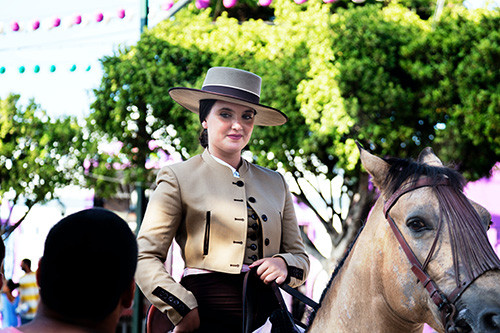
Networking Events in Málaga
As you may already know, people from the south of Spain are very open and welcoming. Becoming friends with Andalusians is not a problem at all. Malaga people are very cheerful and funny. They are always open to having a conversation with you, so you will make friends easily to practice your Spanish with.
In addition to the locals, in Malaga, there is a large network of international people who study or work in the city. Moreover, to break the ice, there is a huge cultural offer of activities and a very lively nightlife.
Websites to meet new people:
Facebook groups:
Fun Things to do in Malaga
Life in Malaga can be full with big events for international young people every year. These events include various excursions to interesting places, outdoor activities, sports leisure, parties, etc. Therefore, a great and youthful atmosphere is always in the air, which allows you to relate and get in touch with other people that share similar interests as yours, whether you are going to study (University) or to work.
Gastronomy
The Province of Malaga is one of the most complete gastronomic regions in Spain and it is characterized by a very healthy diet, in particular, the Mediterranean diet (olive oil, vegetables, fish, etc.). The orography of the region, which combines both sea and mountains, makes it possible to enjoy good fish, tasty and fresh meats all year round.
Another important part of Andalucia gastronomy is "el tapeo". "Tapeo" or "going for tapas" is a gastronomic and essential social activity in Malaga practised on the terrace of bars or indoors, depending on the weather. One "tapa" is basically a small dish that is served in bars for free alongside the drink.
Some of the most typical dishes you should try at least ones are:
- Porra de Antequera: It is a typical dish from the Antequera area, which is very similar to the "salmorejo". The main ingredients are tomato, bread, garlic and oil, green pepper, and vinegar. All crushed and served with boiled egg and ham or tuna.
- Ajoblanco: It is a cold soup of bread, garlic, oil, and vinegar that is usually served with grapes.
- Gazpachuelo: It is a hot soup based on fish, mayonnaise, and potato.
- Malagueña salad: Fresh salad with potato, orange, and cod.
- Espeto: Probably the most recognized dish in Malaga, it is a skewer of sardines grilled with embers and eaten on the beach.
If you're in the mood to order in in Malaga, use GLOVO, the most popular food delivery app among the locals. Make sure to try out Too Good To Go as well - this app will let you save a meal by purchasing it for a lower price!
Sports and activities
Regarding sports, Malaga gives you a fabulous opportunity to continue practicing every day. Thanks to its location, you will be able to practice water sports through sport clubs and private companies. If you are not much of a water person, do not worry, there are many alternatives, such as football, basketball, tennis, paddle tennis, etc. to practice with your friends in different facilities.
As soon as you arrive, ask for information from the nearest tourist office about the places closest to your location and find out about the prices, there are many activities, so you can choose the places you like best.
Beach
One of the main reasons to work in Malaga is its good location. It is a coastal city, with great kilometres of beach to enjoy every day. In general, the temperatures are pleasant all year round and during the summer consider taking a towel and swimsuit to enjoy the sea and sand with your new friends as the water is very warm. Here are some of the beaches we'd like to recommend:
- Calahonda Beach (Nerja): this beach is located in the town of Nerja. It has dark grey sand and turquoise blue waters. One of the most visited beaches by tourists.
- Playa del castillo (Fuengirola). A beautiful beach located at the foot of Castillo Sohail, in the small town of Fuengirola. It is known for its calm vibe since it is quite distant from the city centre. Its clean waters receive the Blue Flag every year, a quality award granted by the European Union. It has an area where you can easily park and a special area for dogs.
- Malagueta beach: It is between the port of Malaga and the Caleta beach and it's one of the most popular beaches in the city. Here you will find a wide variety of chiringuitos (bars on the beach), excellent services (surveillance and rescue, cleaning, rental of umbrellas and hammocks), and a young atmosphere.
- Pedregalejo beach: Located next to the oldest fishing district in Malaga, this 1200 meters beach has the most peculiar promenade in the city. Several restaurants and bars will offer you all kinds of local specialities of excellent quality.
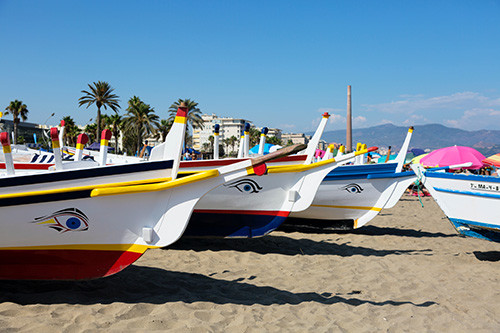
Night Life
If you like to party with your friends, you will love Malaga. There are wonderful discos on the beach, where you can enjoy a good atmosphere all day long. In addition, every month there are many parties dedicated to university students and in particular to international students and young people.
The areas where you can find the best night atmosphere are the historical part of the city centre that is plenty of "tapeo" places, El Palo and Pedregalejo. If you are looking for more modern and fashionable pubs, La Malagueta is your place!
More Interesting Places to Visit
If you find yourself having more time on your hands, there are many other interesting places to visit within Malaga, such as:
- Alcazaba: It is an Arab fortification built between the years 1057 and 1063. The tickets to visit the Alcazaba are not expensive and on Sundays admission is free.
- Museo Picasso: It is one of the two art galleries dedicated to the famous painter from Malaga, Pablo Picasso. Here you can enjoy hundreds of works made by the distinguished artist.
- Castillo de Gibralfaro: This castle, built in the 14th century to protect the Alcazaba, is one of the most visited sites in Malaga. Take a walk around its walls and enjoy the beautiful views of the city.
- Catedral de la Encarnación: This cathedral is one of the gems of the Spanish Renaissance. It impresses with its dimensions and exceptional elevation, and its interior architecture will leave you speechless.
- La Farola: Built during the XIX century, is one of the two Spanish lighthouses that has a female name and is an iconic element in the city of Malaga.
- La Malagueta: It's a central coastal neighbourhood located in front of the famous Malagueta beach. Strolling along the promenade and enjoying the great atmosphere is a must.
- Calle Marqués de Larios: It is one of the most elegant nineteenth-century streets in Spain. During the festivities of the Fair of Malaga and La Semana Santa it becomes the busiest and liveliest street in the city.
- Tívoli World: It is an amusement park located on the Costa del Sol, in the municipality of Benalmádena
- Ronda: A visit that cannot be missed. Ronda is a city near Malaga that is situated on a deep gorge. That gorge separates the new city, which dates from the XV century, from the old town, which dates back to the time of the Arab conquest.
- Marbella: It is one of the most famous city and spa on the Costa del Sol area. In this place, you will find more than 27km of impressive Mediterranean beaches, hotels, and golf facilities.
Cost of Living in Malaga
Accommodation
The cost of living in Malaga is cheaper compared to the other cities in Spain by as much as 45%. Malaga receives loads of international and national young people every year. That is why there are many apartments for rent to students and young professionals, at reasonable prices.
The prices for a room vary between €350-€600, depending on the design and location of each property. The prices for flats start at €700 for a studio and €1000 for an apartment.
We recommend you to search and compare in different online platforms such as Idealista, Milanuncios, and Badi. Also, through Erasmus Play, you can access the large range of accommodation for young professionals in Malaga, compare the prices of all online platforms, and book the one that best suits your budget and location.
The cost of services such as water, gas, and electricity is around €70 per month for a flat of 45 square meters. Sometimes utilities are also included in the rent price.
The average price for a menu in a restaurant is €15. Although, in more fancy establishments the cost could rise to €30 per person.
The price of other services:
- Domestic cleaning service: €11 per hour
- Gyms and swimming pools: €49 per month
- Standard haircut for men: €17
- A short visit to the private doctor: €67 for a medical check-up
Here is an estimation of how much a trip to the supermarket could cost you:
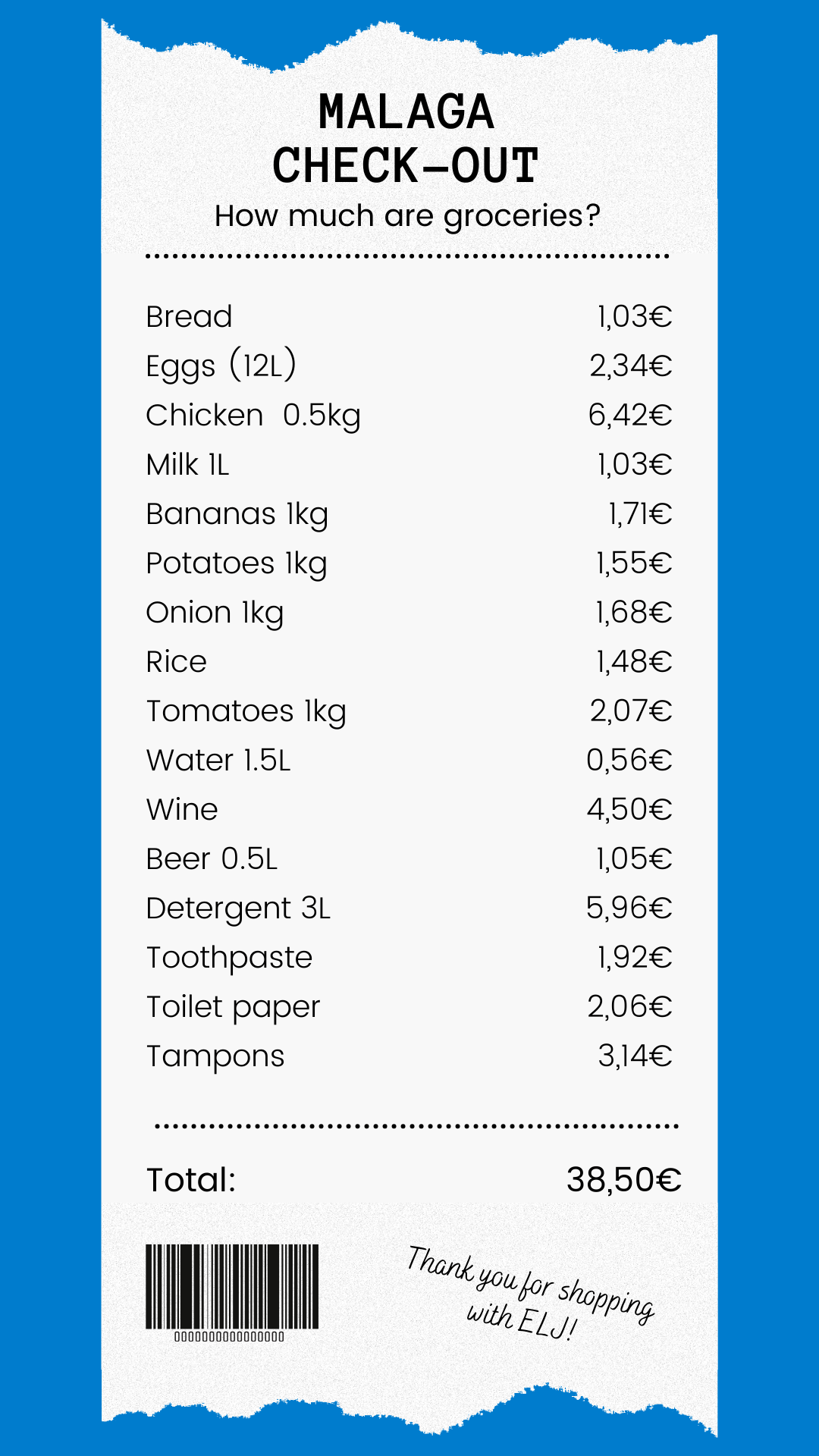
Films and books set in Malaga
Try getting to know the city on an intimate level by reading a few books or watching a few films set or filmed in this magical city.
Movies
-
The Girl with the Dragon Tattoo
A film directed by David Fincher and based on the bestseller of the same name by Stieg Larsson. It narrates the investigation carried out by the journalist Mikael Blomkvist of the disappearance of Harriet Vanger on a remote island in the north of Sweden, at the request of her uncle. He will have the help of Lisbeth Salander, a peculiar private investigator. Together, they will discover the secrets and lies that the family hides.
The final shot of the movie where Lisbeth walks by the sea presents the Pablo Ruiz Picasso promenade, even though in the movie they mention it’s the Cayman Islands.
-
El camino de los ingleses (2006)
An emotional film directed by the famous actor from Malaga, Antonio Banderas, is set in the south of Spain in the 1970s. It tells the story of a young man with kidney disease who dreams of being a poet. In the summer that the film narrates, he will find his muse and together with his friends, he will experience adventures that will change his life.
It was recorded in different places in Malaga: Granada and Mármoles Street, “El Pimpi” bar, and Merced Square.
-
Toro (2016)
A Spanish thriller about Toro, a man who intends to start a quiet life without crimes after getting out of prison. However, after reuniting with his troublesome older brother, his dreams disappear. He will embark on a journey through Andalusia with his brother and his niece pursued by a dangerous man who seeks revenge.
-
Operation Mincemeat (2020)
Based on a true story that took place during World War II and on Ben Macintyre's bestseller “The Man Who Never Was”. It tells the story of the alleged British soldier William Martin, who appeared drowned on the coast of Huelva (Spain) in 1943 carrying sensitive information about the alleged landing of the English and Americans by Greece and France. A disinformation strategy carried out by two members of British intelligence.
Although the story actually happened on the beaches of Huelva, the film is set on the Costa del Sol. Different places from Malaga appear: Paseo del Parque, Puerta Oscura Gardens and San Miguel’s Cemetery.
-
Ture things (2021)
It’s the adaptation of the homonymous novel by Deborah Kay Davies. It tells the story of a young woman who lives on the fringes of society until one day, she begins a relationship with an ex-convict that alters her life.
The shooting of the film began in early 2020 but had to be cancelled due to the Covid-19 pandemic. It was later filmed in the capital of Malaga and in Benalmádena, as well as in other locations on Costa del Sol.
Books
-
Carol’s Voices by Clara Peñalver
A crime novel following inspector Carol Medina in the new investigation of a murder case in the city of Malaga. The writer Abril Zondervan, diagnosed with schizophrenia due to auditory hallucinations, is found dead in what appears to be a suicide. In her writings, Carol will find the clues she needs to solve the case.
-
The Canadian Walk by Amelia Noguera
A story of friendship set in the historical setting of the Spanish Civil War, when the Francoist General Queipo de Llano conquers Malaga and the Republican militia men have to run away. Thousands of women, the elderly and children flee to Almería on what is now known as the Canadian Walk.
Malaga Playlist
If your heart is longing for the hot, sunny Malaga, close your eyes and get lost in the playlists we have created for you.
Have you already decided to move to Malaga? If what you like about Spain is its good vibes, its good weather, and delicious food, Malaga is the perfect job destination for you. Here you will find great job opportunities to progress in your professional career while enjoying an amazing quality of life.
About the authors:
 Erasmus Play- Promoted by Spanish G9 Group Universities and supported by the European Union, Erasmus Play was founded to help international students find accommodation during their studies. They are an accommodation search platform that aggregates a wide range of student housing in one place. Their goal is to guide students in their new environment and help them find the most suitable accommodation. Therefore, Erasmus Play works closely with Universities to offer the best experience for students abroad.
Erasmus Play- Promoted by Spanish G9 Group Universities and supported by the European Union, Erasmus Play was founded to help international students find accommodation during their studies. They are an accommodation search platform that aggregates a wide range of student housing in one place. Their goal is to guide students in their new environment and help them find the most suitable accommodation. Therefore, Erasmus Play works closely with Universities to offer the best experience for students abroad.










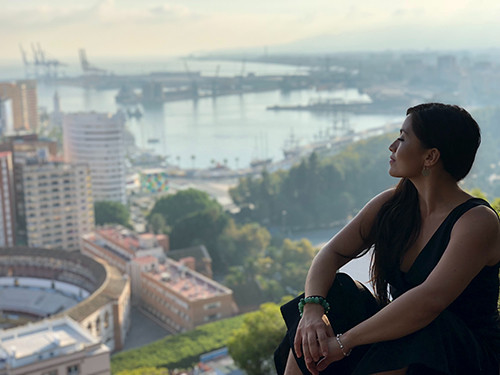

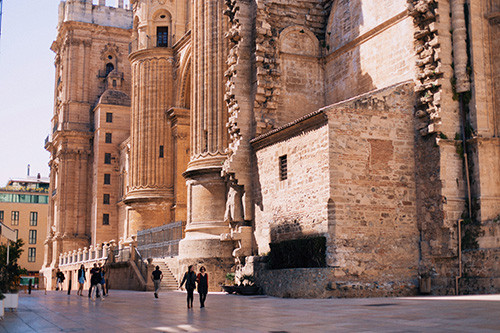

Noemi Gerold10mo ago
My favourite city!
My favourite city!